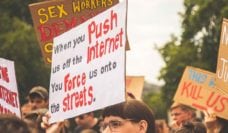Say you’re a sex worker. The pandemic hit, and you can’t work in person anymore. Essentially, you lost your job. Instead of the federal government helping you, they actively disqualify you from financial aid.
During 2020 and 2021, sex workers were ineligible for government-funded pandemic relief, and many struggled to survive. Strippers, porn actors, and sex therapists qualified for COVID-19 government relief aid through the unemployment agency, things like stimulus payments on unemployment checks. Still, many of these workers were paid via under-the-table or private-contractor structures. This means their reported income wasn’t representative of what they actually lived on. Thus their unemployment checks during the pandemic weren’t enough money to survive.
Informal sex workers who operated without an employer could not access stimulus bonuses on unemployment checks or unemployment payments. All sex workers, including strippers and porn actors, were denied the opportunity to file for more significant sums of aid offered through the Small Business Administration, called the Paycheck Protection Program. When the guidelines for eligibility were released, anyone whose primary profession was of a “prurient sexual nature” was disqualified. This included legal and informal sex workers. Because of this, most sex workers, even those able to move their work online, were financially compromised.
Nicole Bromfield, Meg Panichelli, and Moshoula Capous-Desyllas analyzed the intersection between sex workers and the pandemic. The authors looked at how the lives of sex workers were changed by the pandemic, how sex workers responded, and suggested future steps to better the livelihoods of sex workers.
With the immediate loss of income, sex workers developed ways to support themselves and each other. These solutions included mutual aid, online fundraising, and community grants. Mutual aid involved people pooling resources to meet each other’s financial needs. This involved some sex workers helping with babysitting, bandages and medical assistance, or sharing vehicles. Community grants were used when an organization took a portion of its money to sponsor either a smaller organization or a single person. These grants paid for health insurance, a class series or certificate program, or even a vehicle.
Sex workers struggled with elevated risk for COVID-19, housing insecurity, and children at home while working.
All sex worker-led-organizations, run for and/or by current and former sex workers, stayed open during the pandemic and helped provide these financial aid services to sex workers around the United States. Organizations like The Black Sex Work Collective created emergency relief funds, worked on federal policy changes, and assisted with COVID-19 testing and hospital treatment for sex workers throughout the country. One phrase that sex worker-led organizations echoed throughout the first two years of the pandemic was “Nothing About Us Without Us.” They meant any societal changes should contain sex workers’ voices, including policy changes.
Many sex workers still had to navigate institutional barriers related to the illegal nature of their work, immigration status, lack of social service access, and health care needs. Also, sex workers struggled with elevated risk for COVID-19, housing insecurity, and children at home while working. Criminalized by the federal government, sex workers were ineligible for more than just monetary support. Though, the authors note sex workers’ ability to creatively assist each other throughout the pandemic—via mutual aid, sex worker NGOs, and informal assistance —showed the workers’ resilience, resistance, and organization.
Sex workers were forgotten during the pandemic, especially in the federal COVID-19 response. The researchers explain that sex workers experienced a higher risk of job loss, income loss, and health insecurity from the pandemic. Supporting decriminalization efforts for sex workers could help to decrease violence, harm, and disease transmission for both sex workers and clients. The authors suggest supporting community groups and sex worker activist efforts to address the disparity, marginalization, and oppression of sex workers in America. Remember: sex work is work.
Photo via Getty Images
Note: This is part one of a series this month examining how the criminalization and stigma of sex work affects workers in various sectors of the sex industry.
Series introduction – Risky Business: Sex Work Amid the Pandemic














